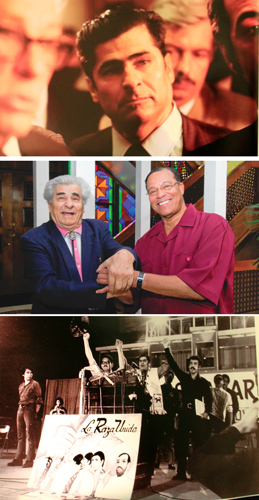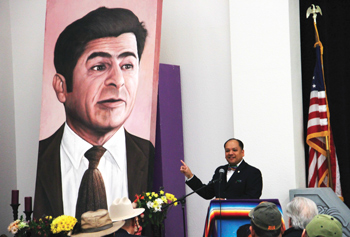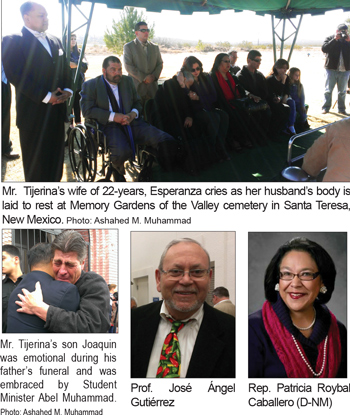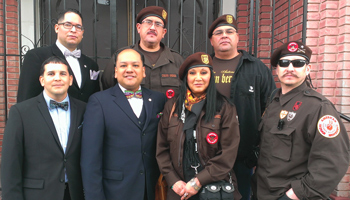“Let us pursue justice and peace. Let us sacrifice our lives for the kingdom of Justice and Righteousness. We can do it. We must do it. Let us do it now, today.”
Reies López Tijerina, June 19, 1968
EL PASO, Texas (FinalCall.com) – Family members and activists gathered here for a three-day celebration of the great life and legacy of revolutionary freedom fighter Reies López Tijerina.
Those who love him call him “El Tigre Del Norte” (The Tiger of the North) and all who spoke of him described him as a man of deep conviction and a man of action who led by example out of a profound love for the oppressed and disenfranchised. A self-taught man who used the Bible and this nation’s original documents, treaties and laws to obtain justice for his people.

“He was one of our prophets, but more than a prophet, he was one of our messiahs,” said Salvador Balcorta, executive director of the Centro de Salud Familiar La Fe. The center does great work with a health facility, school, and technology center serving thousands in El Paso.
Eloy Garcia, an attorney, activist and PhD candidate in history at the University of Texas at El Paso, said Tijerina was a “shining example of self-sacrifice.”
“Brother Reies for us is a shining light. An example of what one person can do and give his whole life for a community. He gave his whole life for our cause–for our people. He’s a man who spoke truth to power and had the guts to do things that nobody else did or only talked about,” said Mr. Garcia.
Many were eager to share their reflections and memorable experiences involving Reies López Tijerina. Cries of “Viva El Tigre del Norte!” and “Que Viva La Raza!” rang out throughout the entire weekend as his strong and dignified wife of twenty-two years, Esperanza, spent moments in quiet reflection and took time to greet all who gathered to honor her husband’s life and sacrifice.
Tijerina and the Chicano movement
Born September 21, 1926 in San Antonio, Texas, Tijerina inspired many during the turbulent ‘60s and continued delivering wise counsel and advice to members of the various activist groups such as the Brown Berets until his last days.
Señor Tijerina was one of the “Four Horsemen” of the Chicano Movement. The others are César Chávez, Rodolfo “Corky” Gonzales, and José Ãngel Gutiérrez. Although Chávez may be the most well-known, many consider Tijerina to be the most militant and influential advocate for Chicano rights.
Chávez steadfastly promoted and engaged in non-violent protests, while Tijerina actually led an armed raid on New Mexico’s Tierra Amarilla county courthouse in 1967. Tijerina saw his actions simply as conducting a citizen’s arrest, and showing his people they no longer had to fear corrupt law enforcement officials. That raid is credited with bringing the issue of land rights to national attention.

In March 1968, Tijerina led the Chicano contingent of the Poor People’s Campaign in Washington, D.C., working with Dr. Martin Luther King Jr., in preparation for the huge march planned for May. Although Dr. King was assassinated on April 4, Tijerina continued to organize and marched with other Chicano movement leaders, along with Coretta Scott King and Ralph Abernathy, who continued with the march as planned even after Dr. King’s death.
He was often harassed by law enforcement, his family threatened, his house fire bombed, and other leaders within the movement who preferred more of an assimilationist, non-confrontational approach used every opportunity to criticize and discredit him. He even spent some time in prison, as most radical rights activists do, but he continued on.
José Ãngel Gutiérrez, an attorney and professor at the University of Texas at Arlington, was a founding member of La Raza Unida Party, a Mexican-American third party movement that actually ran candidates for public offices as it expanded across the U.S. The last living member of the “Four Horsemen” of the Chicano movement.
Mr. Gutiérrez, said he sees something of a leadership void in the Chicano activist community. He recalled a time when Tijerina attempted to place Supreme Court Chief Justice Warren Burger under citizen’s arrest in June of 1969. Justice Berger was so afraid, he exited quickly out a back door fearing Mr. Tijerina’s wrath. Leaders like that aren’t around now, he said.

Mr. Ãngel Gutiérrez knew Reies had visited the Nation of Islam’s headquarters on more than one occasion. “Reies was very far reaching in terms of coalitions,” said Mr. Gutiérrez. “I thought it was a good thing.”
In fact, when Mr. Gutiérrez was 14-years-old, he heard a speech by Malcolm X in Chicago. He told The Final Call, he actually didn’t realize who it was until a decade later.
“I attended a rally of Malcolm X, not knowing who he was,” Mr. Gutiérrez recalled. “What I heard him say when I was 14 resonated with me. When I realized who he was and where I had heard those words, now that Reies was making connections, I felt a coming together and understood better what the plight of all of us has been and who the common enemy is and continues to be,” he added.
Tijerina’s connection to the Nation of Islam
Although he was a former Pentecostal preacher, and Catholicism is dominant amongst the Mexican people, Reies López Tijerina desired to have his body prepared for burial in the Muslim tradition. The Honorable Minister Louis Farrakhan sent Imam Sultan Rahman Muhammad to El Paso to conduct the special preparation for his burial. For many, a request like that would seem surprising, however, Reies López Tijerina’s relationship and interaction with the Nation of Islam goes back decades.
A deep connection and friendship existed between him and the Honorable Minister Louis Farrakhan. In fact, the relationship actually goes back to the time when the Honorable Elijah Muhammad was present. The Honorable Elijah Muhammad referred to Tijerina a “prince of his people.”
In the early ‘60s as an activist Tijerina through media, learned of the work of the Most Honorable Elijah Muhammad and sought him out. Ultimately he was successful at having a meeting with him in Chicago. Some years passed, then later, other events unfolded, and the Hon. Elijah Muhammad sent for Tijerina bringing him to Chicago.
The Hon. Elijah Muhammad met with Tijerina at the National House for five straight days. Tijerina was introduced to top Nation of Islam officials by the Hon. Elijah Muhammad and he also held private meetings only with Tijerina.

Tijerina first met the Honorable Minister Louis Farrakhan in the early 1990s during a large gathering in Los Angeles, California dealing with the unity of the Original people. There is a picture of Reies with Minister Farrakhan that he carried with him, even at the hospital at the end of his days.
Reies Lopez was a part of the Saviours’ Day convention in 2011 and 2012. During those panel discussions, there was a lot shared about the historic relationship between Blacks and Latinos. Tijerina considered the members of the Nation of Islam the “cream of the crop” of Black people. “Reies had so much love for us because of our discipline and our dedication to Islam,” said Steven Muhammad of Phoenix, who is involved in bridging the gap between the Blacks and Latinos and secured Mr. Tijerina and his family on numerous occasions.
Many members of the Nation of Islam participated in the 2008 Sedona Mxodus Retreat organized by Mother Tynnetta Muhammad. They got a dose of the Mr. Tijerina’s passion and charisma.
David Muhammad, who worked to organize the workshops and panels Tijerina participated in during Saviours’ Day said Mr. Tijerina’s history should be known. He traveled from Milwaukee to participate in the weekend’s ceremonies.
“This man was a hero not only for the Chicano people, but for those who desire justice and self-determination for the Original people here in this country. He represents the bridge in many respects to what the Honorable Elijah Muhammad desires in terms of the unity of the Black, the Brown and the Red,” he added.
At the funeral home on January 30, dozens viewed his body wrapped in the Islamic tradition. Many from the community gathered at the Sacred Heart Catholic Church in El Paso’s Segundo Barrio for the funeral mass, January 31 and later that afternoon at the La Fe Culture and Technology Center.
Tijerina’s extensive research over decades led him to Spain and even to the return of confiscated lands for many Indo-Hispano descendants. He founded an organization called Alianza Federal de Mercedes, later known as simply La Alianza, specifically for the purpose of representing and educating those seeking to reclaim what was rightfully theirs as owners of the land. Tijerina preferred to use the term Indo-Hispano to refer to the Chicano people, however many use both interchangeably. The group was officially incorporated on February 2, 1963, the 115th anniversary of the signing of the Treaty of Guadalupe Hidalgo–a key moment in Mexican and American history.
The Treaty of Guadalupe Hidalgo was officially signed on February 2, 1948 by the United States and Mexico ending the Mexican-American war and extending the boundaries of the United States by over 525,000 square miles. Included in the land acquisition included land covering all or parts of including the land covering all or parts of present-day Arizona, California, Colorado, Nevada, New Mexico, Utah and Wyoming.
Some history of the movement can be found in the PBS Documentary “Chicano!: Quest For A Homeland” as well as the book “They Called Me ‘King Tiger’: My Struggle for the Land and Our Rights.”
Patricia Roybal Caballero, a Democratic member of the New Mexico House of Representatives, was a young student activist who gained inspiration from Tijerina and considered him a great hero.
“He was not afraid because he studied and he knew what the facts were. He armed himself with the knowledge to support his convictions.,” said Rep. Royabal Caballero “We were 17 and 18 year olds involved in the Chicano movement and this was a stand for self-determination and the right to that which was most precious to us and that is our ties to our land,” she added.
Many students aided the struggle by delivering supplies like food and water to those involved in the Chicano movement. Often, they were charged with crossing state lines to incite riots, a newly instituted directive enacted during the time of increased student activism nationwide. Later, the charges against many of the young students were dropped.
She was involved in the 1967 siege that made news headlines. Until this very day, her 94-year-old father does not know she was involved.
“I was there,” said Rep. Royabal Caballero. “I was also a Brown Beret and so I had training, and my father was in the military so I’m not afraid of guns. That’s that strength of conviction that you have that is so very important because we believed in the fact that the true history is that this was our land and it was not for any government to negotiate.”
Referring to the states as the “magic four corners” consisting of Arizona, New Mexico, Utah, and Colorado, Rep. Caballero said it was a “monumental change” in the movement. Although they were at times divided over the land grant issue, Native Americans–many from the American Indian Movement–and Chicano activists, converged to support the effort.
Those student activists also linked up to assist the Sioux Nation in their struggle and also found solidarity with those active in the Black Power student movement. To show how deep the ties between the people are, her former husband, Clifton “Chuck” Sutton, was a national Black student leader, and also the nephew of prominent Black civil-rights activist and lawyer who represented Malcolm X, Percy Sutton.
It was fitting that on February 2, the very same day of the signing of the Treaty of Guadalupe Hidalgo, Reies López Tijerina would be laid to rest. After a twenty-five minute drive down Paisano Street, with a 14 foot high Black gate along the border separating El Paso and Ciudad Juárez, Mexico, the funeral procession crossed the border into Santa Teresa, New Mexico, stopping at the Memory Gardens of the Valley cemetery.
“He was always thinking, always reading, he was a great man,” said Joaquin Tijerina, son of Reies Lopez Tijerina.“I feel real sad that he’s gone but I know he’s here with everybody. He was a great man. I’ll miss him, but I’m basically just hurting right now,” he added.
Latino Representative of the Nation of Islam, Student Minister Abel Muhammad delivered the Al-Fatiha in Arabic, Spanish and English over the modest wooden casket holding Reies López Tijerina’s remains paying tribute to the man who was a father, a husband, leader, mentor and prophet.
“We’re here today because God has blessed us with a beautiful man whose character is an example,” said Abel Muhammad. “Not just his eighty-eight years of life amongst us but, also his teachings, his character is an example that we need right now and into the future. We’re here to say good bye to the body but not to the man,” he added.
Tijerina’s wife and others cried and offered prayers as his body was lowered while family members and those who knew him best placed earth on top of the casket.
“We’re here to give thanks because we need these types of men, these types of examples today, more than ever,” said Abel Muhammad. “Although we’re here to lay to rest the body of our brother back in to the earth from whence it came, we can never say good bye to the reality of the man, the spirit of the man, that is present here and will be guiding us and helping us into the future,” he added.
Estela Lopez Reyes, a spokesperson for the Tijerina family said Minister Farrakhan’s aid, and comforting words helped a great deal during this painful time of loss.
“When I heard his words, not only did they soothe me in my moment of pain after having witnessed the physical death of a great man, I heard in Minister Farrakhan’s voice incredible serenity and I needed that at that point and time,” said Estela Lopez Reyes. “I was a person who had just lost a friend. I was a friend who was looking for healing and peace, not just for myself but healing and peace for Esperanza, his wife, his partner, at home, in the heart and on the battlefield. He gave me that with just a few simple words that went directly to the heart of the matter, that this was a noble man who had lived, who had fought, and who had died, an honorable man,” said Ms. Lopez Reyes.
“I found such solace in Minister Farrakhan’s words,” said Ms. Lopez Reyes. “He made me feel so at peace. The fact that he took the time to personally call me and offer that kindness, I will be forever grateful,” she added.
The Nation of Islam’s support was also invaluable, with members serving as honorary pallbearers, and creating a nurturing and protective hedge around the family members during their time of grief. Having a delegation present was a powerful demonstration of unity, countering the misrepresentations of Islam and Muslims by the “dark-minded media” and “evil intentioned people,” said Ms. Lopez Reyes.
“The fact that Abel shares our cultural roots and our language is a powerful bond,” said Ms. Lopez Reyes. “To send us one of our own gave such healing to this experience and also helped those who know not of the Nation of Islam, know not of what it means to be a true Muslim, what it means to pronounce the name of Allah with love and peace regardless of your mother tongue. To do that created another opportunity for people to learn and understand.”












